Medically Reviewed by: Dr. Kedar Patnekar (MBBS, D.N.B, D.C.H, Specialist Pediatrician) Dubai, UAE.
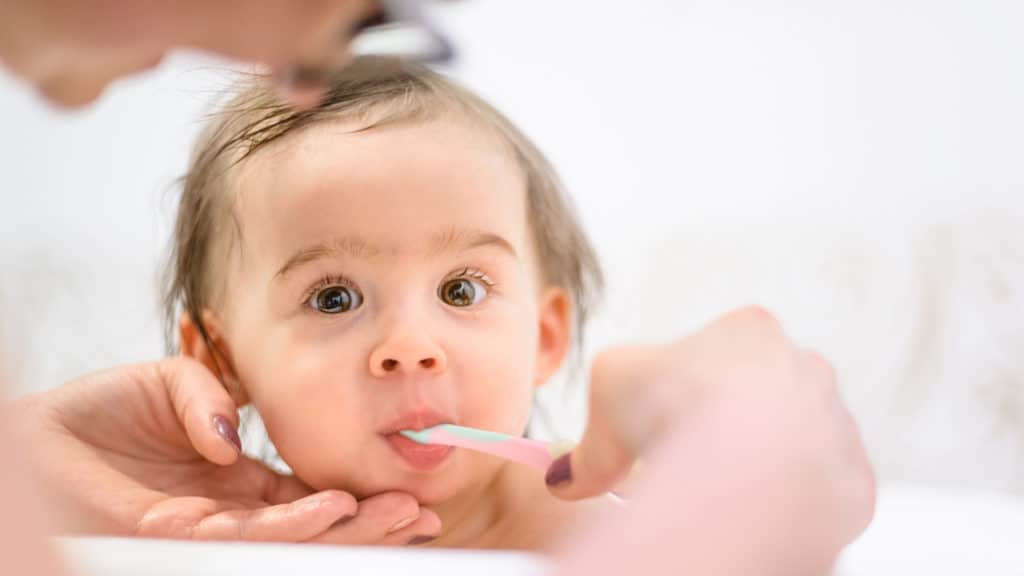
Teething Fever - Table of Contents
Teething is a natural process that is observed in babies when they are around 6 months old. Although there have been some cases where the baby’s first tooth has erupted when the child is around 12 months old. My triplets had late tooth eruptions too. It’s completely normal.
With teething, you will find that your toothless baby has become crankier than usual, they drool quite a lot, and have a slightly raised temperature than usual.
When my daughter was around 6–7 months, I noticed that her body temperature was elevated. As a father, I was worried for my little princess and so was my wife, but my mom and my grandmother both checked her gums and concluded that she just had teething fever and it was completely harmless.
This made me wonder if there was really any relation between teething and fever—basically does teething really cause fever? I checked with my pediatrician and what I understood from him is what I have elaborated in this article to help all parents who have similar queries.
Basically, a baby undergoes a lot of pain while teething which starts at around 6 months of age. This is the same age at which your child becomes more prone to illness because the immunity shield that they got from their mothers through breastfeeding/formula starts diminishing because of the introduction of complimentary foods at this age.
At this stage, it becomes hard to distinguish if your child is feeling discomfort because of teething or some illness. During teething your child experiences a lot of discomfort which can be accompanied with slight increase in the baby’s body temperature.
If your child is having a high fever then it is time to seek help from your pediatrician. This article will provide you with a better understanding of whether your baby is uncomfortable due to teething or due to something else, and it will further help you understand the difference between fever due to teething and due to other illnesses.
We have also provided detailed explanations about teething, its symptoms, teething fever, its causes, and also some frequently asked questions.
Is there a relation between teething and fever?
There has always been some ambiguity regarding teething—whether teething and fever are occurring simultaneously by chance or is teething the reason for the fever. In short, is teething fever a reality or myth!!
The simple fact is that teething has nothing to do with fever. During teething, there is only a slight hike in body temperature that starts just two days before teething and lasts only for a day or two after the tooth erupts, but it remains less than 100.4 degrees Fahrenheit.
There is a difference between teething fever and fever that one can be easily observed. If the body temperature of the baby is higher than 100.4 degrees Fahrenheit, then it is fever and can be due to some illness or infection.
Experts have confirmed that body temperature during teething can be higher but teething doesn’t cause fever. So teething fever is just a mild change in body temperature and you don’t need to worry about it. The hike in body temperature during teething remains less than 100.4 degrees Fahrenheit. But if the temperature is higher than what is observed in normal teething fever, then there are chances that your baby is suffering from some other problem that has come into the limelight during teething.
You need to provide extra comfort and care to your baby while they are teething. If your baby is having a temperature above 100.4 degrees Fahrenheit and it has been persistent for the last 24 hours, then you should seek assistance from a pediatrician.
Read this next
Identifying fever
Teething fever only causes a mild increase in body temperature that remains less than 100.4 degrees Fahrenheit and lasts for not more than 2–4 days—these are also referred to as normal teething temperatures or normal teething fever temperatures. If your baby is having a temperature above 100.4 degrees Fahrenheit then you can consider it as a fever caused due to some sort of infection.
There can be a coincidence that your baby is having high fever and is teething simultaneously. When the child is around 6 months old, the immunity of the child that they received through the placenta during last three months of pregnancy starts diminishing. Not only this, we also introduce other foods apart from breast milk/formula that causes the immunity to drop further. It’s a coincidence that this is the very same age at which the child starts teething. So, it won’t be apt to say that teething causes fever.
When you encounter high fever while your child is teething then the real reason behind it might be some other prevailing infection that led to temperatures exceeding 100.4 degrees Fahrenheit. You need to be careful and keep a check on them to know what is causing discomfort to your little munchkin.
Teething symptoms
There are some symptoms that you will witness when your child’s teething journey starts. Let’s have a closer look at them so that you can understand better regarding fever from teething and other discomforts faced by your baby.
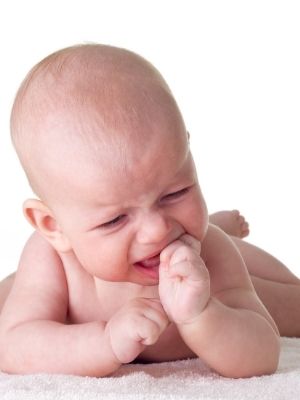
Irritation
The babies are prone to discomfort during teething. This discomfort leads to irritation in babies and they become crankier than usual. Teething is a very painful process for babies because they are about to erupt their first teeth from the gums. When you feel that your baby is showing signs of irritation then there might be chances that they are teething. In this scenario, you need to spend more time with your baby so that they can find comfort to cope with teething and teething fever (fever associated with teething).
Cheek rubbing and ear pulling
If you observe your child rubbing their cheeks or pulling their ears then this might be a sign of teething. During teething, the baby feels a lot of pain in the gums and this gives rise to irritation in the cheeks and ear. There might be some other infection if this symptom persists for a long time. In this case, you should seek help from the child’s pediatrician. You can rub the gums of the child with a clean finger to give them some ease from the discomfort.
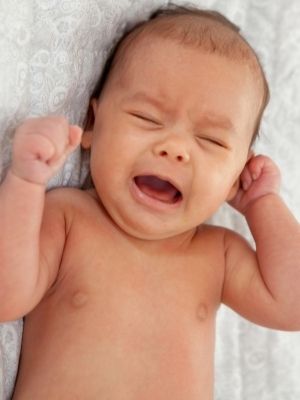
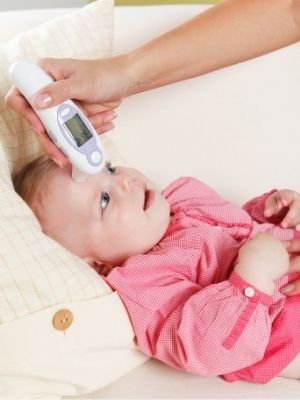
Fever from teething—normal teething temperatures
There are many cases in which the parents think that teething causes fever, but there is no concrete evidence to prove the same. You can encounter a rise in the temperature of your munchkin while teething, but it will not go beyond 100.4 degrees Fahrenheit. This is a symptom of teething.
Less interested in solids
If your baby is teething, then they are more likely to avoid solid food if they have started consuming them. The baby will feel uneasiness in consuming solids and will be more inclined towards consuming liquids. If you are breastfeeding then the baby has an inclination to be more relaxed when being breastfed.

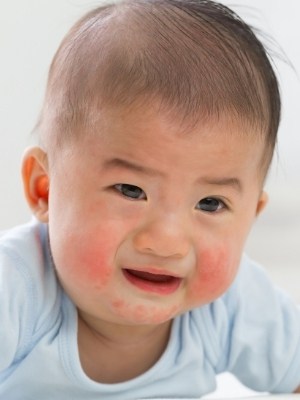
Rashes on face—teething rash/drool rash
If the baby starts developing rashes around the mouth due to drooling, as the salivary glands become more active than they were previously, then this is a clear symptom of teething. But, in case if the rashes remain on the skin for a longer duration – more than 7-10 days, then this might be a sign of some infection. You should consult your child’s pediatrician for the same.
Other fever symptoms in a baby
The fever from teething (or more commonly referred to as teething fever) in babies is different from the actual fever suffered by the baby due to some illness or infection. There are various notions that teething causes fevers but it is not the case. Fever is a whole different scenario in babies. The baby is said to have fever when their temperatures exceeds 100.4 degrees Fahrenheit. Here are some of the common symptoms that you can witness when a baby is suffering from actual fever.
- Dehydration
- Weakness
- Body aches
- Loss of appetite
- Sweating
- Shivering
Based on the cause of fever, there can be other symptoms observed as well. Fever is predominantly caused due to bacterial infections or viruses and there may be higher chances that the baby’s immunity is not very strong to fight infections.
How to soothe a baby’s sore gums?
If you are sure that your baby is teething, i.e. you have carefully monitored the symptoms of teething, then here are some useful tips that can surely help you to comfort your little one. Once you are sure that your child is suffering from acute pain due to teething, then you should try and soothe them. Let’s have a glance at some of the useful tips that can help to soothe sore gums.

Rub the gums gently
If your baby is undergoing teething, then rubbing the gums is ideal to soothe the gums of the baby. You can use a clean finger to apply some pressure on the gums so that the baby get some relief.
Using a wet washcloth
A tremendous amount of relief is encountered by babies when they are provided with a wet washcloth while teething. It helps to a great extent to calm your munchkin’s sore gums.
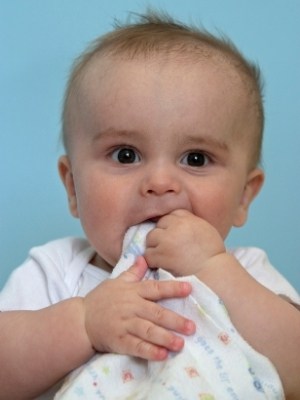
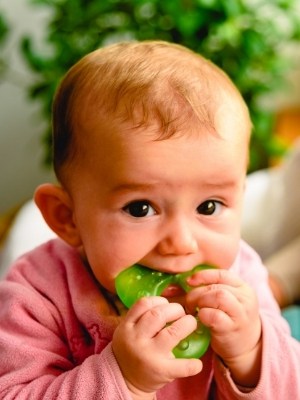
Teether
A teether comes to your rescue when you want to soothe your baby from the pain of sore gums. A chilled teether can help tackle a lot of pain while teething.
Seek help from a professional
If your child is getting unbearable pain during teething and you are unable to find a way to provide them comfort, then contacting a pediatrician can help you a lot.
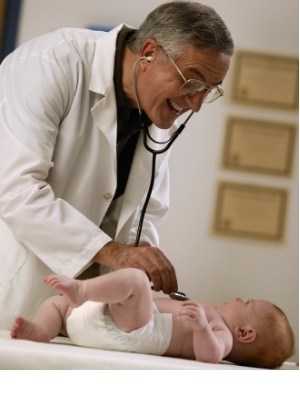
What needs to be avoided during teething?
Many instances of teething have been witnessed in which usage of some products has caused more harm than good. Relieving your child from the teething pain becomes the immediate concern of the parents. But, if you don’t go for legitimate solutions then your little one can suffer even more. These are some dangerous things that you should avoid at any cost:
Teething tablets
Many experts have discouraged parents from giving any sort of homeopathic tablets to their babies because these medicines contain some toxic substances that are not good for babies.
Teething creams and gels
Teething creams and gels are not an effective alternative to help babies get rid of the pain of teething. Researches have shown that these products contain some lethal substances that can even be fatal. FDA has warned against the usage of teething creams and gels.
Frozen teething rings
Teething rings are known to reduce pain encountered by babies and some rings have to be chilled in the fridge before giving them to the child. Ensure that you do not freeze these types of rings in the freezer. These absolutely frozen rings could harm and bruise your munchkin’s delicate gums instead of soothing them. They can hurt your child’s gums to a great extent. To be on a safer side, completely avoid any such rings.
Teething necklaces
The innovations in technology have given rise to this brand new teething necklace for getting rid of teething pain. But they are highly risky for babies. If these necklaces are broken, then they can cause huge problem for you as well as for your baby. They are made from materials like amber, marble, or silicon that have the potential to cause infection or mouth injury or even choking if the jewelry piece is broken.
The FDA released an official warning against the use of such jewelry/ necklaces etc. which are being marketed as teething pain relievers, in December 2018. This came into light after they receiving numerous reports of children choking on beads that break off and an child who got strangled to death by an amber necklace during nap.
How to calm a teething baby?
When a baby undergoes teething, you can’t even imagine the pain they are going through. You can only realize the discomfort suffered by the baby from their painful crying. There are several ways to check and confirm whether your baby is teething and has a teething fever. If you are sure that your baby is teething then you should try to lean towards some natural ways to comfort your child. Have a look at some of the treatments for teething that can make your baby less cranky and comfy.
Mother is the best comfortable place
A child feels better when they are with their mother. Breastfeeding a baby can soothe the baby in no time. This doesn’t work for all babies, but it can be a super-effective remedy that can surely do wonders for the pain of your little munchkin.
Applying pressure on the gums
Applying pressure to the sore gums is one of the best solutions for relieving teething pain. You can massage the sore gums with a clean finger so that the baby feels comfortable. Wooden rings or spoons are also beneficial for applying pressure on gums to get rid of the pain. Teething causes fever is not at all true, because it is a sheer coincidence.
Using cold items for chewing
Consuming cold items for getting relief from teething pain is a very effective tool. Just make sure that you only provide those items for chewing that don’t choke the baby in any way. Using a wet washcloth can help relieve the pain from teething.
When to see a pediatrician
You can seek the assistance of a pediatrician if your child is showing symptoms while teething that are not getting cured by any of the remedies. If your child is undergoing teething fever, then it should be a slight hike in body temperature that doesn’t even go beyond 100.4 degrees Fahrenheit. If your baby is crying a lot and showing signs of itching then it is not just teething fever and something else that needs your attention.
There is no truth in the fact that teething causes fevers. You can take the advice of a pediatrician if your child is not consuming a proper diet and is not sleeping properly at night.
Few Teething Fever FAQs
Q1. Does teething cause fevers?
Teething is not related to fever. If the body temperature of your child exceeds 100.4 degrees Fahrenheit, then you can consider it as fever. Otherwise, a mild teething fever that increases the body temperature slightly is just normal during teething. Fever from teething is absolutely not true, because teething is not related to fever. Temperatures beyond 100.4 degrees Fahrenheit show that it is not just teething fever and you need to seek a doctor. So to answer the question ‘does teething cause fever?’—the answer is NO. Teething fever is just a slight increase in body temperature.
Q2. How long does a teething fever last?
A teething fever (slight fever due to teething) lasts only for a couple of days. Teething causes slight fever only for a day or two before the teeth are about to erupt through the gums, and once the tooth cuts through the gum, the teething fever soon becomes normal. During teething, the body temperature is higher than normal but once the tooth erupts, the teething fever vanishes in no time.
Q3. Do babies have a temperature when teething?
Teething is responsible for only spiking the body temperature to about 100.4 degrees Fahrenheit. If the baby is having a temperature of more than 100.4 degrees Fahrenheit, then it is probably due to some infection or other illness. Teething causes fever is completely false, as per the experts. The body temperature of a baby only hikes a bit during teething, but that does not correlate to teething fever.
Q4. What is a normal temperature range of teething fever?
A normal teething fever is considered to be a temperature less than 100.4 degrees Fahrenheit. If the teething fever temperatures are higher than this, then you need to find the reason behind it and consult a pediatrician immediately. A teething fever is usually accompanied by symptoms like irritation, crying, rashes, ear pulling, etc.
Q5. Is your baby teething or sick?
Understanding teething fever/fever from teething plays a vital role in deciding whether your baby is teething or sick. If your baby shows symptoms of teething like drooling, irritability, crying, having rashes, having teething temperatures around 100.4 degrees Fahrenheit, which is slightly higher than the normal body temperature, then your baby is probably teething. On the other hand, if these symptoms persist for a longer time or the temperature is higher than 100.4, then the baby is probably not teething, and the fever is caused due to some other infection or illness that you need to diagnose at the earliest.
Q6. Can you treat the baby’s fever symptoms at home?
Yes, you can treat the baby’s fever symptoms at home. You need to make sure that your little one consumes a lot of fluid to help them bring the fever down. It can be treated by dressing the baby in light clothes so that a large amount of heat is not absorbed. However, in case your child is becoming weak or not recovering for more than 2–3 days, then please consult your pediatrician immediately.
Final thoughts
Your baby’s first tooth is erupting and they are in pain. It is important for you to stay calm and understand their pain. Try and comfort them and stay with them through this tough time. Your mere presence can work wonders for your child.
You don’t need to worry about teething fever at all. You have understood that teething causes fever is a misconception. If your baby is teething and having a body temperature lower than 100.4 degrees Fahrenheit, then you can consider it as normal teething fever. Normal teething temperatures do not exceed 100.4 degrees Fahrenheit. But if the temperature exceeds the bar of 100.4 degrees Fahrenheit, then there is some other infection or ailment affecting your child other than just teething fever.
If you see your little one drooling, appearing irritated and cranky, seeking more comfort from you, showing a slight increase in temperature, etc., then these are just common symptoms of teething. But if all these problems are not getting resolved within a timeframe of 7–8 days (the usual duration of the teething process), then you should immediately consult a pediatrician to help your little one with whatever is troubling them.
Bottom line is Teething Fever is just a slight rise in body temperature, and teething causes fever is a myth. So let those pearly whites shine and let go of your worries about teething fever. We wish your baby HAPPY Teething!




Best Content I Have Found Every Time On This Site, Best Of Luck.